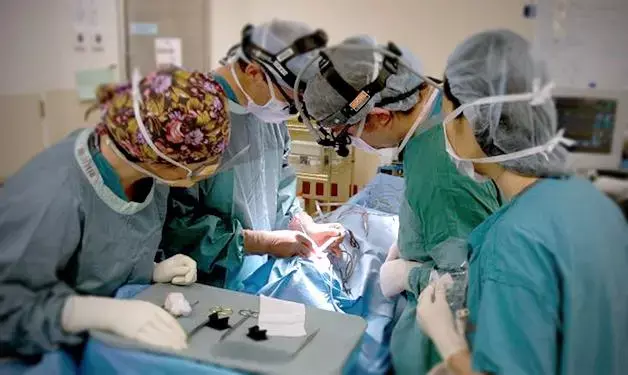- Home
- Medical news & Guidelines
- Anesthesiology
- Cardiology and CTVS
- Critical Care
- Dentistry
- Dermatology
- Diabetes and Endocrinology
- ENT
- Gastroenterology
- Medicine
- Nephrology
- Neurology
- Obstretics-Gynaecology
- Oncology
- Ophthalmology
- Orthopaedics
- Pediatrics-Neonatology
- Psychiatry
- Pulmonology
- Radiology
- Surgery
- Urology
- Laboratory Medicine
- Diet
- Nursing
- Paramedical
- Physiotherapy
- Health news
- Fact Check
- Bone Health Fact Check
- Brain Health Fact Check
- Cancer Related Fact Check
- Child Care Fact Check
- Dental and oral health fact check
- Diabetes and metabolic health fact check
- Diet and Nutrition Fact Check
- Eye and ENT Care Fact Check
- Fitness fact check
- Gut health fact check
- Heart health fact check
- Kidney health fact check
- Medical education fact check
- Men's health fact check
- Respiratory fact check
- Skin and hair care fact check
- Vaccine and Immunization fact check
- Women's health fact check
- AYUSH
- State News
- Andaman and Nicobar Islands
- Andhra Pradesh
- Arunachal Pradesh
- Assam
- Bihar
- Chandigarh
- Chattisgarh
- Dadra and Nagar Haveli
- Daman and Diu
- Delhi
- Goa
- Gujarat
- Haryana
- Himachal Pradesh
- Jammu & Kashmir
- Jharkhand
- Karnataka
- Kerala
- Ladakh
- Lakshadweep
- Madhya Pradesh
- Maharashtra
- Manipur
- Meghalaya
- Mizoram
- Nagaland
- Odisha
- Puducherry
- Punjab
- Rajasthan
- Sikkim
- Tamil Nadu
- Telangana
- Tripura
- Uttar Pradesh
- Uttrakhand
- West Bengal
- Medical Education
- Industry
One-fourth patients experience functional decline after noncardiac surgery: Study

Canada: 25% of participants reported a functional decline following major elective noncardiac surgery, show results from a multicentre prospective cohort study in the journal Anaesthesia.
"Lower self-reported pre-operative physical fitness was associated with self-reported functional decline up to 1 postoperative year. Postoperative moderate or severe complications were associated with functional decline at 30 post-operative days," wrote the authors.
Self-reported postoperative functional recovery is rarely measured or considered in research and decision-making despite it being an important patient-centered outcome.
K. S. Ladha, St. Michael's Hospital, Toronto, ON, Canada, and colleagues conducted a secondary analysis of the measurement of exercise tolerance before surgery (METS) study for associations of peri-operative variables with functional decline after major non-cardiac surgery.
The researchers recruited patients who were at least 40 years old and had or were at risk of coronary artery disease and who were scheduled for non-cardiac surgery.
The primary outcome was a reduction in self-care, mobility, or ability to conduct usual activities (EuroQol 5 dimension) from before surgery to 30 days and 1 year after surgery.
The researchers reported the following findings:
- A decline in at least one function was reported by 40% participants at 30 days and 24% participants at 1 year.
- Participants who reported higher pre-operative Duke Activity Status indices more often reported functional decline 30 days after surgery and less often reported functional decline 1 year after surgery.
- The odds ratios of functional decline 30 days and 1 year after surgery with moderate or severe postoperative complications were 1.46 and 1.44.
- Discrimination of participants who reported functional decline 30 days and 1 year after surgery were poor.
One quarter of participants reported functional decline up to one postoperative year, the authors concluded.
"More participants reported decline than improvement in at least one EQ-5D functional domain 30 days after surgery but not 1 y after surgery," they wrote. "Functional decline was associated with worse pre-operative fitness and moderate or severe postoperative complications."
Reference:
The study titled, "Functional decline after major elective non-cardiac surgery: a multicentre prospective cohort study," is published in the journal Anaesthesia.
DOI: https://associationofanaesthetists-publications.onlinelibrary.wiley.com/doi/full/10.1111/anae.15537
Dr Kamal Kant Kohli-MBBS, DTCD- a chest specialist with more than 30 years of practice and a flair for writing clinical articles, Dr Kamal Kant Kohli joined Medical Dialogues as a Chief Editor of Medical News. Besides writing articles, as an editor, he proofreads and verifies all the medical content published on Medical Dialogues including those coming from journals, studies,medical conferences,guidelines etc. Email: drkohli@medicaldialogues.in. Contact no. 011-43720751




